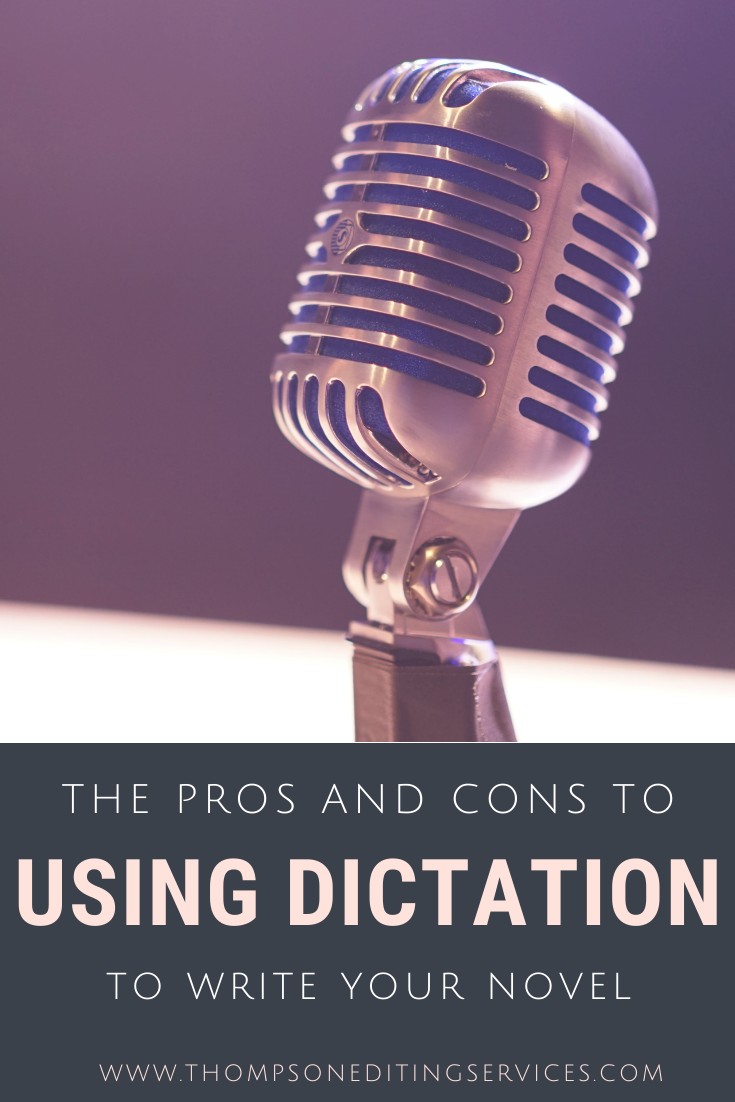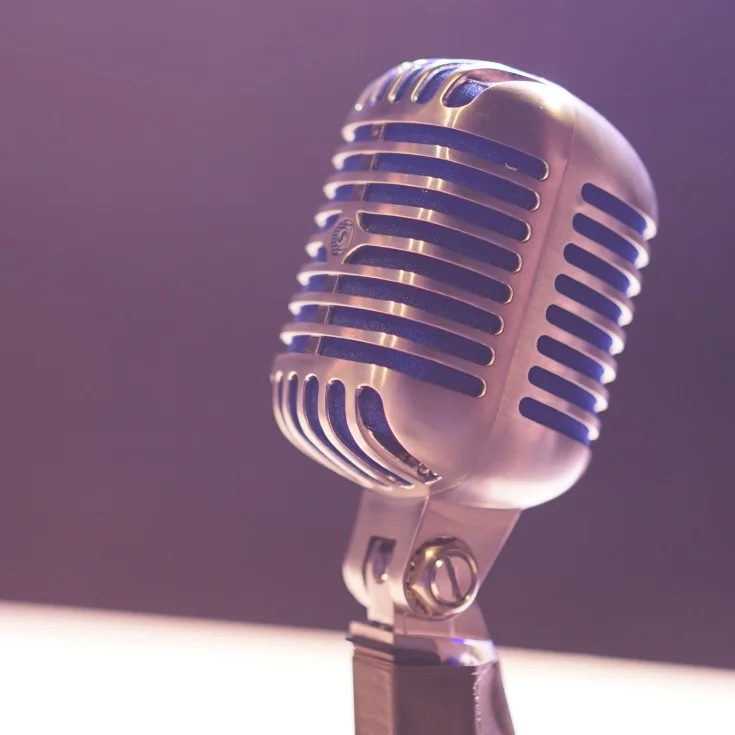The Pros and Cons to Using Dictation to Write Your Novel
I was listening to an episode of The Self-Publishing Show podcast where they had author Kevin J. Anderson on as a speaker, and he talked about how he used dictation to write the first draft of his books—and he has many! And I listened to another episode of The Self-Publishing Show podcast with another author who used dictation. And then another author talked about it. And then another author. After hearing Kevin J. Anderson talk about it, I was intrigued, and after the fourth or fifth author, I was convinced. I needed it try dictation.
Writing with dictation is the process of telling your story by speaking out loud and recording that audio. Then you transcribe or have a software transcribe the audio into text, and you work from there to then edit your draft on your computer or tablet. But the thing that sold me on trying dictation were the benefits of it. There are several of them, and they are big ones.
The Pros of Using Dictation to Write a Novel
#1: you can write more words in less time
Even a trained typist or an experienced author who has been writing on the computer for thirty years still cannot type faster than we can speak our words. When you dictate your writing, you could write a whole chapter in one hour when it would normally take you two or three hours.
If you're like me and have a hard time allotting big chunks of time to writing because of other responsibilities in life, being able to write more words in your limited time is huge. Or maybe writing is your full-time job, and writing more words faster would allow you to publish more books or meet your deadlines more easily.
#2: health benefits
A couple of years ago, I had chronic back pain that was so severe that I couldn't do my normal daily activities. I was in constant pain no matter what I did. Through exercises and physical therapy, I don't struggle with it as much anymore, but the back pain is still there if I spend too much time sitting at a computer. This is a common issue among authors and anyone who sits at a desk for a long period of time multiple times a week.
With dictation, you are able to step away from your computer using a handheld recorder or app on your phone, reducing the amount of time you sit each day. Just the other day, I wrote 1,000 words with dictation while I walked half a mile all in less than 15 minutes. The ability to get up and move gives you more time for two of the most important tasks in your life: writing and exercising.
#3: getting away from the dreaded blank page
You know you've been there before: staring at a blank page on your computer, the mouse blinking, waiting for you to think of something to write. But no matter how hard you try, nothing will come to mind. Nothing can make your fingers move across those keys and pound out words.
With the freedom that dictation provides, you can step away from the blank computer screen that not only doesn't spark creativity but also often hampers it. If being outdoors walking in a park sparks your creativity, you can easily go out there and write your story with dictation. If folding laundry sparks your creative imagination, then you can write your book while folding the laundry with dictation. Or maybe it's just the freedom itself that sparks your creativity. With dictation, you are no longer bound to the computer and can find what best sparks your creativity to write more.
#4: writing a cleaner first draft
As you will see in one of the cons below, a downside to dictation is that even the best dictation software's are not perfect. You will still have to go back through and edit the words that the transcription did not fully understand or add in punctuation that was missed or you didn't feel like speaking out loud.
But this also presents a pro to dictation. Because you have to go back through and check the transcription, and because you dictated faster than you could've typed, you are able to write the first draft and go back and edit it in the matter of time that it would've taken you to type the first unedited draft.
The first couple of times I dictated, I was able to dictate about 1,000 words in less than 15 minutes, and then I was able to go back and edit those 1,000 words in just over 15 minutes By the time 30 minutes had passed, in which time I could've typed 1,000 words—maybe—if I tried really hard and stressed and hurried, I had easily written 1,000 words stress-free and had already edited them. Using this method, you can complete your first draft with it already been completely edited once.
The Cons of Using Dictation to Write a Novel
#1: you have to train yourself
If you've been writing on your computer or tablet or even by hand for a long time, it has become a habit to you. It may have even become a part of your creative process. You might also think that you are not an oral storyteller. That's why you became a writer, right?
But dictation is possible for everyone. It just requires training yourself and making it your new habit. It may feel awkward at first—it sure did to me—but give it a few tries, and you will find that you get used to it. There are also resources available online on how to dictate your. novel.
#2: you have to speak your punctuation
This was one of the reasons that I was hesitant to try dictation. I wanted to think about my story and how to creatively develop my characters and plot and setting. I didn’t want to have to think about saying “period” every time I had to end a sentence. I thought surely there was a way around it if authors were using it to write their books.
But then I found out that there wasn't. It's just part of training yourself and making it that new habit. And trust me—you do get used to it.
#3: transcriptions are not perfect
As I mentioned above, no matter how good your transcription software is, it's still won't get everything right. That means that you will have to go back and edit it to catch all of the typos and missing punctuation.
And if you write fiction like I do, you might not feel like saying, “quotation mark” every time two are needed in dialogue, which is often. Instead, I just focus on the main punctuation marks—commas and periods—and then I add in the quotation marks during editing.
But as I mentioned under pro number four, this can work in your favor. You can use it as an opportunity to edit your work as you write and finish your book with a clean draft.
Software Options
So, as you can see, there are both pros and cons to dictation, but once you get the hang of it, it can increase your speed, help you stay healthy, and help you write a better book overall. I encourage all writers to at least give it a try.
The Dragon Naturally Speaking software is the common software that authors use for dictation and transcription, but it's not available for Macs. For now, I am using an app called Just Press Record on my phone that allows me to make recordings and then it automatically transcribe them. I email it to myself from there and add it to my Word document or Scrivener document that I'm currently working on.
If you’re not sure yet if you’d like dictation in the long run, try using your computer or phone’s built in dictation option or purchase the Just Press Record App for only $4.99 (at the time of writing this). If you later decide you what to use dictation and want to upgrade, then you can invest in the Dragon Naturally Speaking software.
Have you ever tried dictation? What was your experience like? Do you have any tips for using it? Share in the comments below!
*This article was written with my Just Press Record app on my phone and edited in a Word document. It took me 36 minutes to dictate and edit these 1,400 words, and I am only one week into using dictation. I look forward to seeing how my speed increases over these next few months.
About the Author
Meagan Thompson created ThompsonEditingServices.com to teach authors how to become better editors of their books. She also provides professional editing and formatting services.
When she isn’t editing or writing, Meagan enjoys watching movies with her husband, sharing meals and playing games with family and friends, listening to jazz music, and dreaming about her next travel destination.












